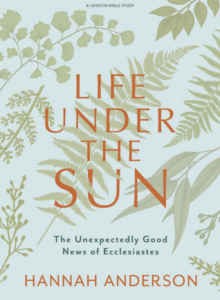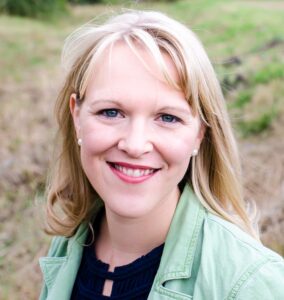As believers, we can sometimes struggle to voice our doubts. Hard questions about life and faith force us to be honest with ourselves and acknowledge how much we don’t know. But we may also avoid asking hard questions because we’re afraid they show a lack of faith—that we don’t trust what God is doing in our lives.
But the book of Ecclesiastes invites us to ask the hard questions about life. Throughout the book, the Teacher (the main personage in the book) asks things like:
“How is it that the wise person dies just like the fool?” (2:16)
“What does the worker gain from his struggles?” (3:9)
“What advantage then does the wise person have over the fool? What advantage is there for the poor person who knows how to conduct himself before others?” (6:8)
“For who knows what is good for anyone in life, in the few days of his futile life that he spends like a shadow? Who can tell anyone what will happen after him under the sun?” (6:12)
We could dismiss these questions as the musings of a cynical man who has lost faith. But a better reading hears them as the cry of the human heart desperately trying to make sense of life. In this way, we can hear our own questions: How can life be so hard and so unfair? Why do good people suffer while evil goes unpunished? If God is good and powerful, why do all these bad things happen? Where is God in all this?
Honestly expressing our doubts does not mean that we lack faith. In fact, the exact opposite might be true. In the words of Anselm of Canterbury, an 11th century pastor, our questions can be “faith seeking understanding.”1 Even more, asking God the hard questions shows that we trust Him enough to come to Him with them. In voicing our doubts, we show we believe He will respond. And while He may not give us a full explanation of our pain, He will answer us.
There’s no better example of this than Jesus Himself. While bearing the weight of sin on His shoulders, He cries out from the cross, “My God, my God, why have you abandoned me?” (Mark 15:34) Scholars note that Jesus is quoting from Psalm 22 where the psalmist writes:
My God, my God, why have you abandoned me?
Why are you so far from my deliverance
and from my words of groaning? (v. 1)
Like the Teacher in Ecclesiastes, the psalmist is speaking to God in a frank, direct way about his pain and loss. But the psalmist knows something beyond his own doubts. He knows that God is his only hope. “Don’t be far from me,” he continues, “because distress is near and there’s no one to help.” (v. 11).
And eventually God does answer him (22:21). God does not “hide his face from him but listened when he cried to him for help” (22:24). So, too, God did not ignore Jesus’s question. Because three days later, the Father raised Him from the grave, proving He had not abandoned Him. And so in questioning God, in asking, “Where are you in all this?” both the psalmist and Christ show us what true faith looks like. It looks like asking God the hard questions, knowing that He and only He holds the answer.
Part of living “life under the sun” means understanding that we may never get explanations for our suffering. We may never know why we were abandoned by a parent. We may never understand why the business we worked so hard to create collapsed underneath us. We may never fully reconcile how evil preys on the most innocent.
But this does not mean that God doesn’t welcome our questions or that He won’t respond when we cry. Instead, we can be confident that just as He heard and responded to Jesus, He will hear and respond to us. He will be present in our doubt and confusion. He will stay with us all our weary days on earth. And each time we suffer, each time we find ourselves walking through the valley of the shadow of death, we can be confident He is with us and will raise us to new life on the other side.
Learn more about how the writer of Ecclesiastes asked questions about faith in Life Under the Sun: The Unexpectedly Good News of Ecclesiastes. Through this 8-session Bible study, Hannah Anderson invites us to consider the wisdom of Ecclesiastes afresh as we search for a solid foundation for life under the sun. Together, we’ll learn to name our anxieties, concerns, and disappointments. We’ll discover how Ecclesiastes is more than self-help or good advice—how it frees us to ask the questions that Jesus Himself will eventually answer. And through its raw honesty and unflinching commitment to goodness, we’ll find hope in the One who guides all days under the sun.
ABOUT HANNAH ANDERSON
Hannah Anderson is an author and Bible teacher who lives in the Blue Ridge Mountains of Virginia. Her books include Humble Roots: How Humility Grounds and Nourishes Your Soul, Turning of Days: Lessons from Nature, Season, and Spirit, and the recently released, Heaven and Nature Sing. Hannah’s goal is to encourage believers to think deeply and broadly about how the gospel transforms every area of life.
You can connect with her at her blog sometimesalight.com and on X @sometimesalight.
Work Cited
1. “Anselm of Canterbury (1033–1109),” Encyclopedia of Philosophy, accessed December 4, 2023, https://iep.utm.edu/anselm-of-centerbury/.
The post Asking Hard Questions About Your Faith appeared first on Lifeway Women.
DMTBeautySpot
via https://dmtbeautyspot.com
Erin Franklin, DMT.NEWS, DMT BeautySpot,




0 comments